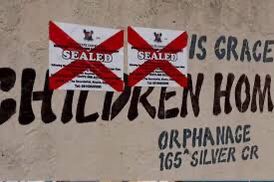In a significant move to safeguard vulnerable children and uphold child welfare standards, the Lagos State Government has taken decisive action by shutting down five orphanages over the past year for serious offenses, including baby trafficking and violations of the State Child Rights Law of 2015. This development, announced by the Commissioner for Youth and Social Development, Mobolaji Ogunlende, during the 2025 Ministerial Press Briefing, underscores the state’s commitment to protecting children from exploitation and ensuring that orphanages operate within legal and ethical boundaries. The briefing, which marked the second year of Governor Babajide Sanwo-Olu’s second term in office, shed light on the government’s rigorous efforts to reform the child welfare system and combat illicit practices in orphanages across the state.
Lagos, Nigeria’s bustling economic hub, is home to millions of residents, including many vulnerable children who rely on orphanages for care and protection. While many of these facilities operate with genuine intentions, providing shelter, education, and support to orphaned and abandoned children, others have been found engaging in unethical practices that exploit the very children they are meant to protect. Issues such as baby trafficking, illegal adoptions, and failure to adhere to child rights laws have raised alarm bells, prompting the Lagos State Government to intensify its oversight of orphanages.
The State Child Rights Law of 2015 is a cornerstone of Lagos’ child welfare framework. It outlines strict guidelines for the operation of orphanages, including proper registration, adherence to adoption procedures, and the protection of children’s rights to safety, education, and dignity. Non-compliance with these regulations is considered a serious offense, as it undermines the well-being of vulnerable children and exposes them to exploitation. The recent closures reflect the government’s zero-tolerance stance on such violations and its commitment to enforcing accountability within the system.
The Crackdown: Five Orphanages Shut Down
During the 2025 Ministerial Press Briefing, Commissioner Mobolaji Ogunlende revealed that five orphanages were shut down within the past year due to egregious violations. Among the most notable cases were God’s Time Orphanage in Igando and Lifetime Changer Orphanage in FESTAC, both of which were found to be engaging in practices that directly contravened the state’s child welfare laws.
God’s Time Orphanage, located in the Igando area of Lagos, was shut down for multiple reasons. The facility was found to be in violation of the State Child Rights Law of 2015, which mandates that orphanages prioritize the well-being and rights of children in their care. Investigations revealed that the orphanage was not only improperly registered but also guilty of mismanagement, which compromised the quality of care provided to the children. This included inadequate facilities, poor record-keeping, and a failure to adhere to legal adoption processes. Such lapses not only endangered the children but also raised concerns about the orphanage’s transparency and accountability.
The closure of God’s Time Orphanage serves as a stark reminder of the importance of proper oversight in child welfare institutions. Without adherence to regulatory standards, orphanages risk becoming environments where children are neglected rather than nurtured. The Lagos State Government’s swift action in this case demonstrates its commitment to ensuring that only facilities meeting stringent criteria are allowed to operate.
Perhaps the most shocking case was that of Lifetime Changer Orphanage in FESTAC, which was shut down for engaging in baby trafficking—a heinous crime that exploits vulnerable children for profit. Baby trafficking involves the illegal sale or transfer of children, often under the guise of adoption, to individuals or networks for financial gain. This practice not only violates the State Child Rights Law but also constitutes a grave human rights abuse.
The discovery of baby trafficking at Lifetime Changer Orphanage highlights a disturbing trend that has plagued Nigeria’s child welfare system for years. Unscrupulous operators, posing as caregivers, exploit loopholes in the system to profit from the illegal trade of children. Such activities often target vulnerable populations, including abandoned infants and children from impoverished families, who are then sold to unsuspecting or complicit adopters. The closure of Lifetime Changer Orphanage sends a clear message that the Lagos State Government will not tolerate such exploitation and is actively working to dismantle networks involved in these illegal activities.
In addition to God’s Time and Lifetime Changer, three other orphanages were shut down for failing to adhere to legal adoption procedures and other regulatory requirements. While specific details about these facilities were not disclosed during the briefing, the government’s actions suggest a broader pattern of non-compliance within the sector. Issues such as improper documentation, failure to register with the state, and disregard for child welfare standards were cited as common reasons for the closures.
These closures are part of a broader effort by the Lagos State Government to clean up the orphanage system and ensure that only credible and compliant institutions are allowed to operate. By taking a hard stance against violators, the government aims to protect children from harm and restore public trust in the child welfare system.
To prevent further violations and ensure compliance with child welfare laws, the Lagos State Ministry of Youth and Social Development has established a dedicated monitoring unit. This unit is tasked with conducting regular inspections of orphanages, verifying their registration status, and ensuring that they adhere to legal and ethical standards. The unit also investigates reports of abuse, neglect, or illegal activities within these facilities, enabling the government to take swift action when violations are uncovered.
The monitoring unit’s work has been instrumental in identifying and addressing issues within the orphanage system. By maintaining a proactive approach, the unit ensures that children in care are protected from exploitation and that orphanages operate in line with the State Child Rights Law. The government’s investment in this oversight mechanism reflects its recognition of the critical role that orphanages play in safeguarding vulnerable children and the need to hold these institutions accountable.
While the closures highlight the challenges within the system, the Lagos State Government has also made significant strides in promoting child welfare. During the same period, 68 orphanages were fully registered after meeting the state’s stringent requirements. An additional 45 facilities received provisional approval, indicating that they are on track to achieve full compliance pending further improvements.
The registration process involves rigorous screening to ensure that orphanages have the necessary infrastructure, staff, and policies to provide quality care. This includes proper facilities for accommodation, education, and healthcare, as well as adherence to legal adoption procedures. By granting full registration to 68 orphanages and provisional approval to 45 others, the government is fostering a network of credible institutions that prioritize the well-being of children.
These efforts demonstrate a balanced approach to child welfare reform. While cracking down on violators, the government is also supporting orphanages that show a commitment to meeting regulatory standards. This dual strategy ensures that children in need of care have access to safe and nurturing environments while rooting out those who exploit the system for personal gain.
The closure of five orphanages is a step in the right direction, but it also highlights broader systemic challenges within Nigeria’s child welfare system. Baby trafficking, in particular, is a complex issue that requires coordinated efforts across multiple sectors, including law enforcement, social services, and the judiciary. The Lagos State Government’s actions are a critical part of this fight, but addressing the root causes of baby trafficking—such as poverty, lack of education, and weak regulatory enforcement—will require sustained efforts at both the state and national levels.
Moreover, the closures raise important questions about the fate of the children who were housed in these facilities. The government has not provided specific details about the relocation or rehabilitation of these children, but it is imperative that they are transferred to safe and compliant orphanages or placed in foster care where their needs can be met. Ensuring a smooth transition for these children is a critical component of the government’s responsibility to protect their rights and well-being.
The Lagos State Government’s crackdown on rogue orphanages is a commendable effort to protect vulnerable children and uphold the rule of law. However, it also serves as a call to action for all stakeholders—government agencies, civil society organizations, and the public—to work together to strengthen the child welfare system. This includes raising awareness about legal adoption processes, supporting vulnerable families to prevent child abandonment, and investing in social services to address the root causes of exploitation.
For individuals and organizations looking to support child welfare in Lagos, there are several ways to get involved. Donating to reputable orphanages, volunteering with child welfare organizations, and advocating for stronger policies are all meaningful steps toward creating a safer environment for children. Additionally, prospective adoptive parents must exercise due diligence by working only with registered orphanages and following legal adoption procedures to avoid inadvertently supporting illegal activities.
The closure of five orphanages for baby trafficking and child rights violations is a bold statement from the Lagos State Government that it will not tolerate the exploitation of vulnerable children. By shutting down facilities like God’s Time Orphanage and Lifetime Changer Orphanage, the government is sending a clear message that child welfare is a top priority. At the same time, the registration of 68 orphanages and provisional approval of 45 others demonstrate a commitment to building a robust and ethical child welfare system.
As Lagos continues to grow as a global city, its efforts to protect its most vulnerable residents will be a key measure of its progress. The government’s actions in 2025 mark an important milestone in this journey, but the work is far from over. By maintaining vigilant oversight, supporting compliant orphanages, and addressing systemic challenges, Lagos can set a model for child welfare that other states and countries can emulate. For now, the closure of these five orphanages is a powerful reminder that every child deserves a safe, nurturing environment—and that the Lagos State Government is committed to making that a reality.
Join our Whatsapp channel to stay updated always!


